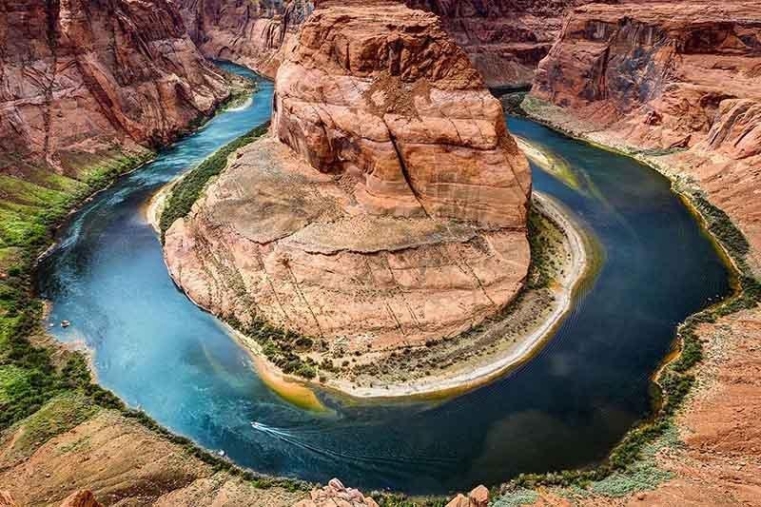Droughts Double Impact on Lake Powell: Declining Water Levels and Capacity
The effects of prolonged drought conditions are reaching a critical point at Lake Powell, a crucial reservoir in the American Southwest. Declining water levels have become a concerning reality, with the lake currently at significantly lower elevations than historic norms. This decline is not merely a change in aesthetics; it poses serious implications for water supply, power generation, and ecosystem health in the region. As the water dips, the natural beauty of the lake is overshadowed by the stark reminder of what could become a permanent state if climatic trends continue. Key points to consider include:
- Water Supply Strain: The reduced inflow exacerbates water shortages for millions who rely on the Colorado River system.
- Hydroelectric Power Risks: Lower water levels hinder the lake’s capacity to generate hydroelectric power, leading to potential utility disruptions.
- Ecological Imbalance: Aquatic habitats suffer as fish populations decline and essential flora are adversely affected by reduced water availability.
In addition to the falling water levels, the total capacity of Lake Powell is becoming a growing concern as sediment accumulation reduces usable storage space. This dual challenge of less water supply and diminished capacity creates a perfect storm, further stressing an already over-extended resource. The underlying causes can be attributed to years of sustained drought and the broader impacts of climate change, which bring unpredictable weather patterns. Communities, environmentalists, and policymakers are urging immediate action as the urgency to address these compounding challenges escalates. Key considerations include:
- Enhanced Water Management: Innovative conservation strategies and policies are critical to managing the dwindling resource effectively.
- Public Awareness Campaigns: Educating communities on sustainable water usage and conservation methods to mitigate further decline.
- Investment in Alternatives: Exploring alternative water supplies, such as desalination and wastewater recycling, to alleviate dependency on reservoir levels.

Understanding the Consequences of Shrinking Reservoirs for Ecosystems and Communities
The alarming decline of reservoirs, such as Lake Powell, is not merely a statistic; it represents a profound shift in the health of both ecosystems and the communities dependent on them. As water levels fall, several critical consequences emerge. Species that thrive in these aquatic environments face habitat loss, leading to a decline in biodiversity. Fish populations may become particularly vulnerable, affecting local fishing industries and the food sources of wildlife, while vegetation that relies on consistent water sources suffers, altering the landscape and threatening terrestrial ecosystems. Furthermore, as sediment accumulates in shrinking reservoirs, the water quality deteriorates, which can lead to harmful algal blooms that pose risks to both aquatic life and human health.
Moreover, the socio-economic implications for surrounding communities are equally concerning. With lower water levels comes reduced hydroelectric power generation, which can lead to increased energy costs and reliance on alternative energy sources. Communities may face challenges such as access to drinking water, agricultural scarcity, and dwindling recreational opportunities, directly impacting local economies reliant on tourism and outdoor activities. The shrinking capacity of reservoirs means that stakeholders—ranging from farmers to city planners—must reconsider water management strategies to mitigate the impacts of ongoing drought and climate variability, making sustainable solutions more urgent than ever.

Innovative Solutions for Water Conservation Amid Persistent Drought Conditions
The alarming decline in Lake Powell’s water levels has prompted a wave of innovative strategies aimed at mitigating water scarcity in the region. Experts are harnessing technology to enhance rainwater harvesting, creating systems that capture and store precipitation for use during dry spells. Moreover, smart irrigation technologies are gaining traction, allowing farmers to optimize water usage based on real-time data and soil moisture levels. This not only conserves water but also ensures crops receive the precise hydration they need to thrive in challenging conditions.
Community-led initiatives are also emerging as effective solutions. Local governments and organizations are advocating for landscape transformation through the promotion of drought-resistant plants and xeriscaping, significantly reducing the need for traditional irrigation. Furthermore, educational programs aim to raise awareness about water conservation practices among residents, empowering them to make informed decisions. these collective efforts highlight a crucial shift towards sustainable management of water resources, illustrating that even in the face of persistent drought, innovation and community engagement can lead to significant improvements in conservation efforts.

Future Projections: What Lies Ahead for Lake Powell and Regional Water Management
The ongoing drought conditions have ushered in a new era of uncertainty for Lake Powell, as both its water levels and reservoir capacity continue to diminish. This persistent decline poses critical challenges for regional water management and raises questions about the sustainability of vital water supplies for millions. Experts indicate that projections for Lake Powell’s recovery are grim, primarily due to a combination of historical over-allocation of water resources and changing climate patterns. Without innovative and immediate changes in water management practices, the capacity of this essential reservoir is at risk of further reduction, leading to heightened competition among users and affecting agricultural, municipal, and ecological needs.
Looking ahead, it is crucial for local authorities and stakeholders to explore adaptive management strategies that prioritize conservation and efficiency. Key measures may include:
- Implementing stricter water usage regulations to curb excessive consumption.
- Investing in infrastructure to enhance water capture and storage capabilities.
- Promoting community awareness of the ongoing water crisis to encourage responsible water use.
- Enhancing interagency collaboration to optimize the distribution of available resources and support sustainable practices.
By embarking on these initiatives, regional leaders can lay the groundwork for a more resilient water management framework that not only addresses current shortages but also prepares for an uncertain hydrological future.
As we confront the stark realities of climate change and its cascading effects on vital water resources, the situation at Lake Powell serves as a critical warning sign. The combination of persistent drought and dwindling water capacity not only jeopardizes the ecosystems and communities reliant on this massive reservoir but also underscores the urgent need for comprehensive water management strategies. With scientists and policymakers increasingly acknowledging the limitations of our current systems, there is a pressing call for innovative solutions and collective action. As we move forward, it is essential to prioritize sustainability and resilience in our water resources, ensuring that future generations can navigate the challenges posed by a changing climate. The plight of Lake Powell is not just an environmental concern; it is a reflection of the broader struggle to balance human needs with the fragility of our natural world.





